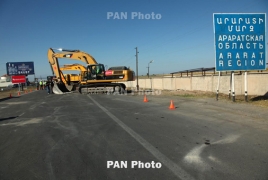Parliament debates on $150 million loan agreement with EDB June 22, 2015 - 18:13 AMT PanARMENIAN.Net - At an extraordinary session on Monday, June 22, Armenia’s National Assembly discussed the draft agreement with the Eurasian Development Bank (EDB) on provision of $150 million investment to finance construction of the North-South Transport Corridor, ARKA reports. The agreement was signed on April 14 this year by Armenia's Minister of Transport and Communication Gagik Beglaryan and EDB chairman Dmitry Pankin. Deputy Minister of Transport and Communication Artur Arakelyan said the loan will be granted by the EurAsEC Anti-Crisis Fund for a period of 20 years with a 5-year grace period and a fixed interest rate of 1.65%. The $150 million loan will be used to finance construction of a 20.5 - kilometer section of the Corridor from the town of Agarak to Kajaran in the southern Armenian province of Syunik. The North-South project aims to improve Armenia’s main 556 - kilometer corridor as part of a broader thrust to improve connectivity, as well as boost trade, development opportunities in the Caucasus and throughout Central Asia. The transport corridor will stretch from the southern Armenian town of Meghri (on the border with Iran) to Bavra in the north (on the border with Georgia). The North-South Transport Corridor will enable Armenia to alleviate the consequences of the blockade imposed by Azerbaijan and Turkey. According to Armenian officials, the construction of the Corridor will cost some $1.5 billion. The Armenian government had earlier signed a $500 million framework loan agreement with the Asian Development Bank to finance the project. According to EDB, the implementation of this project will cut transport costs on the rehabilitated road section by 50%, increase the average speed of traffic by 40%, reduce operating costs for maintaining the highway in good condition, create about 1,750 new jobs, boost transit traffic through the territory of Armenia from India, Iran and Pakistan and help partially overcome the consequences of Armenia’s blockade. Indirect effects will also be observed, such as increased access of farmers from remote areas to the consumer markets, development of retail and warehouse infrastructure in the central part of the country. It will also make basic health and educational centers more accessible to the population of remote regions. Yerevan has dismissed Turkey’s demand to shut down the Armenian nuclear power plant as “inappropriate”. Armenia will loan 2.9 billion drams to Nagorno Karabakh (Artsakh), according to a draft government decision. The Ministry of Ecology and Natural Resources of Azerbaijan has “strongly condemned” Armenia’s decision. Kerobyan has said that for the first time in the history of Armenia, the volume of foreign direct investments amounted to about $1 billion. Partner news |